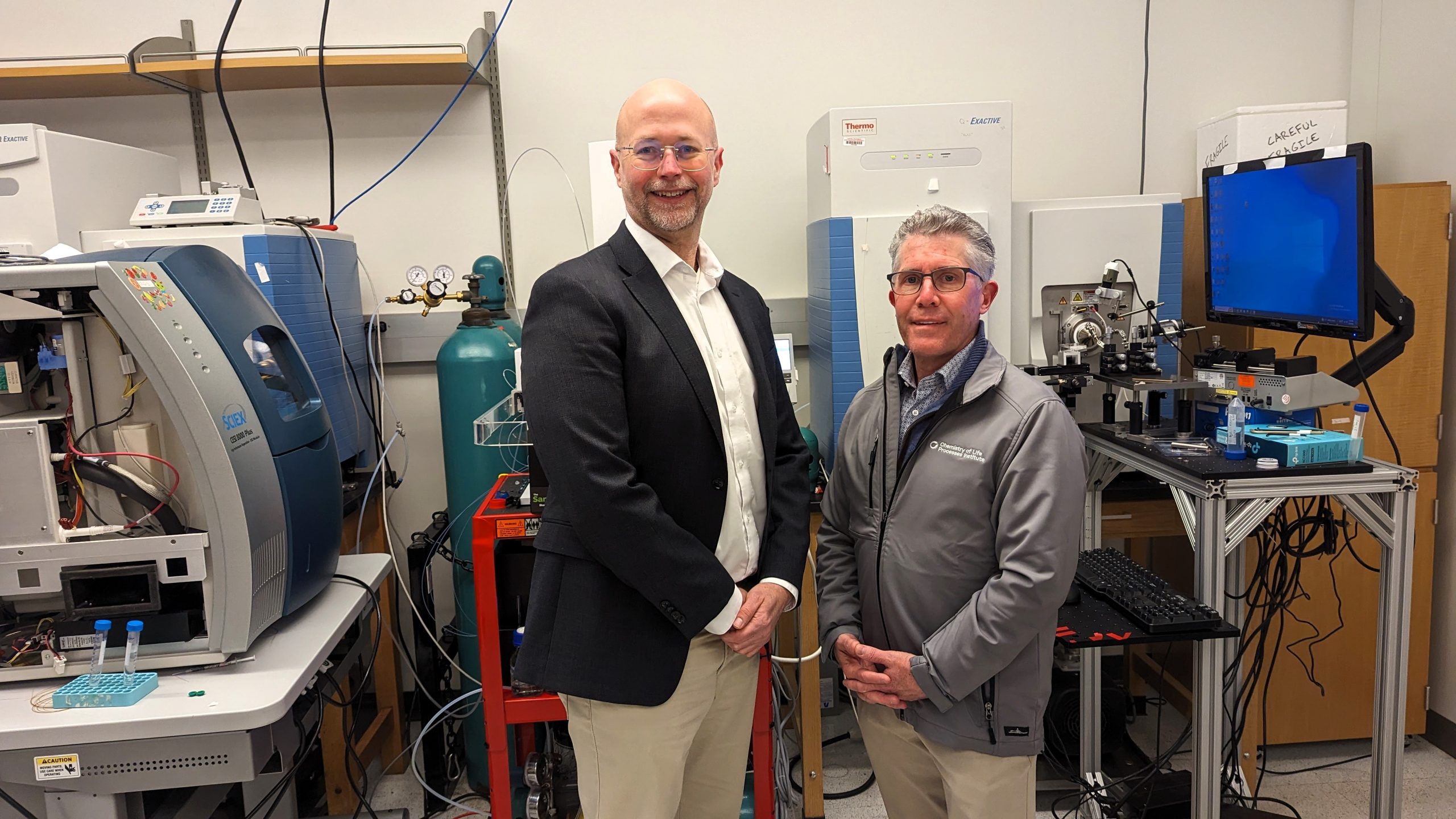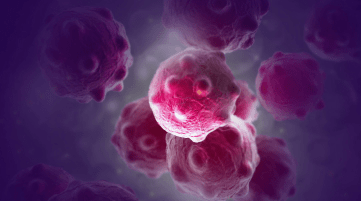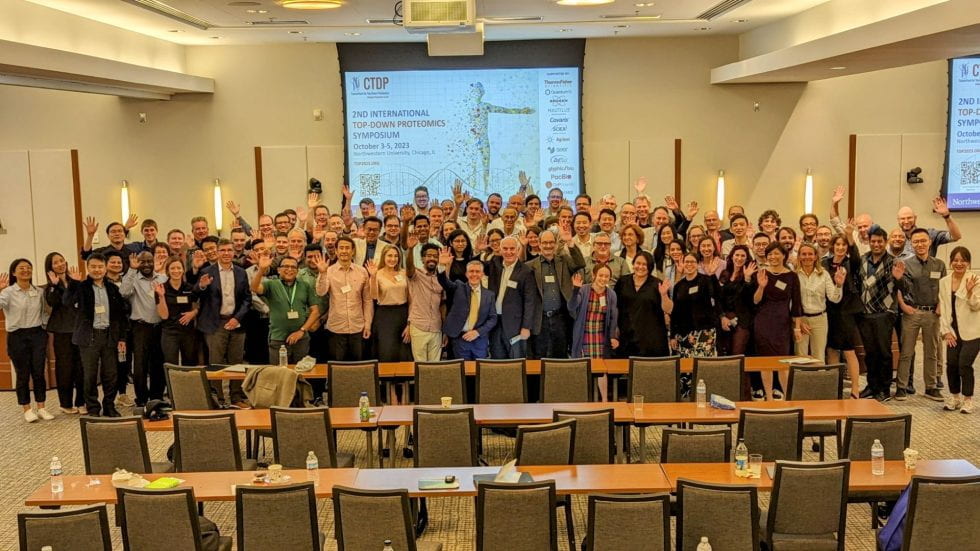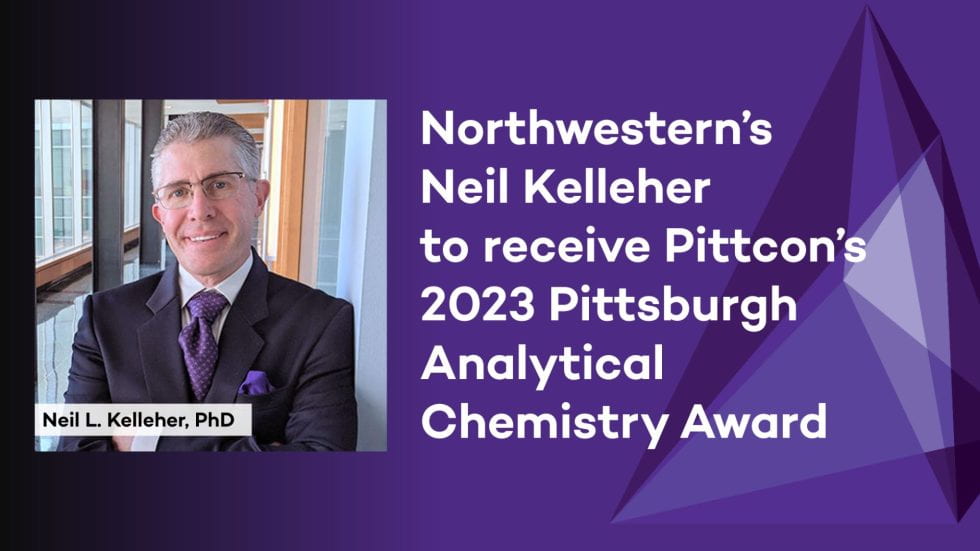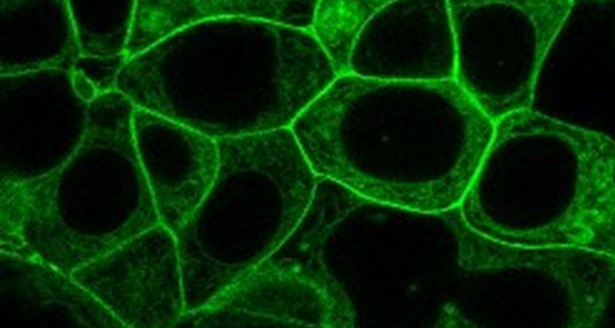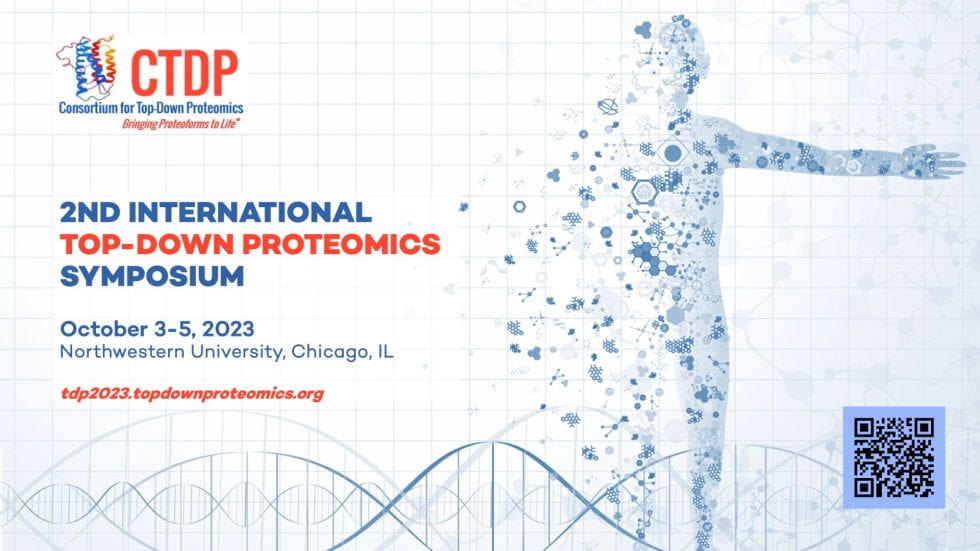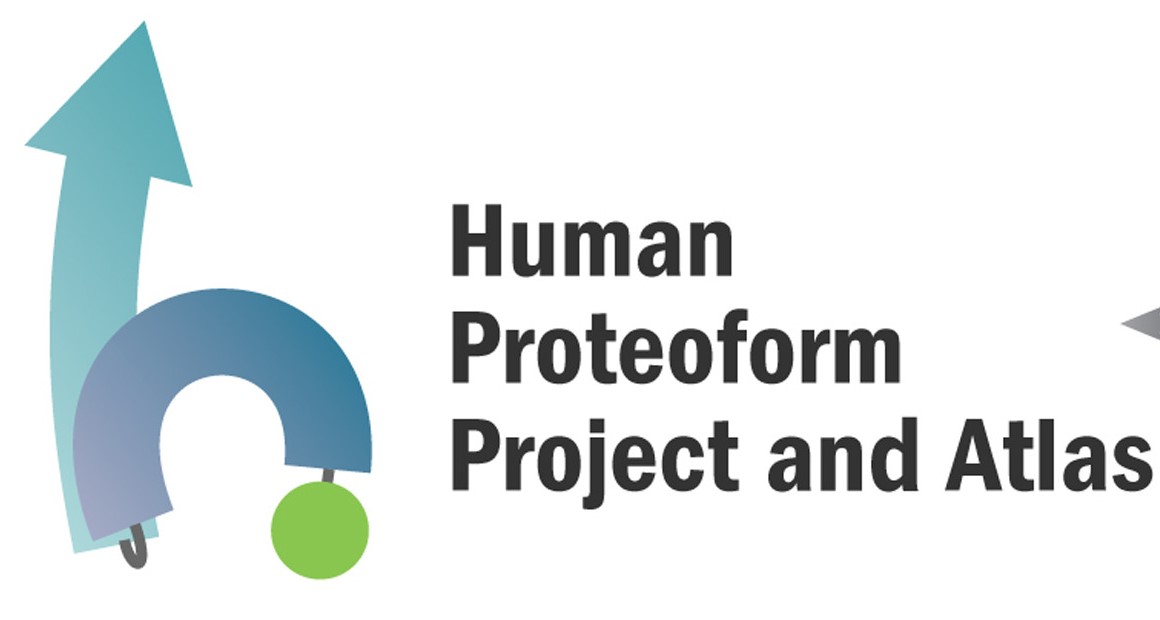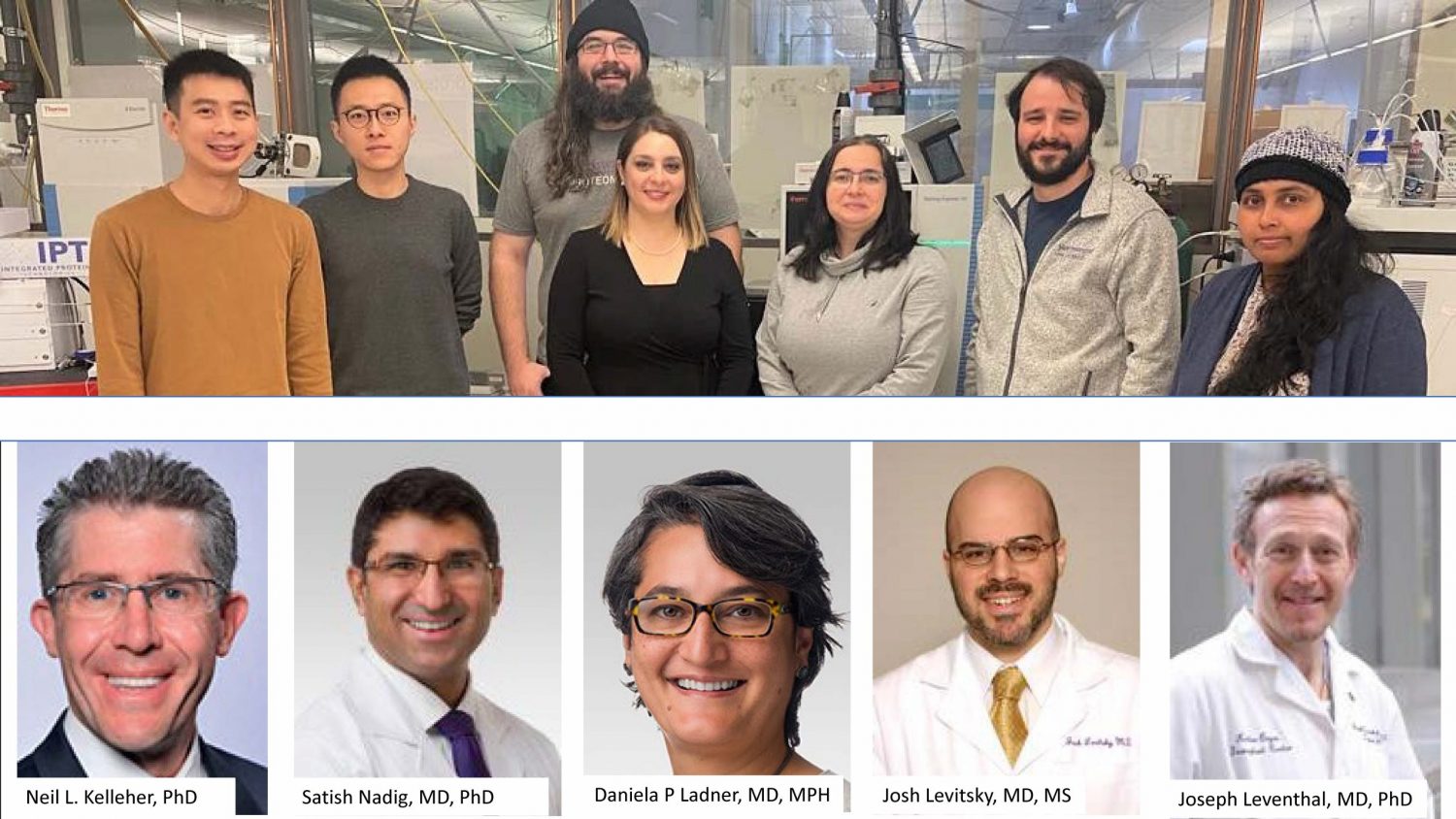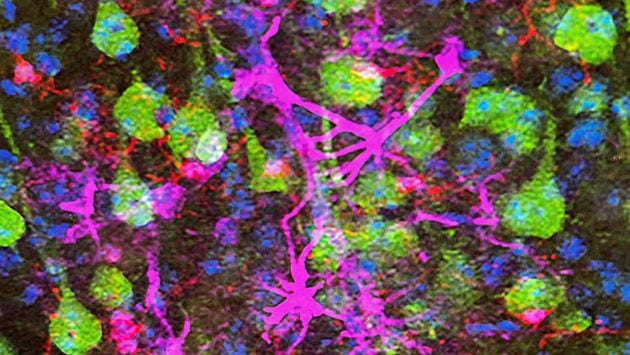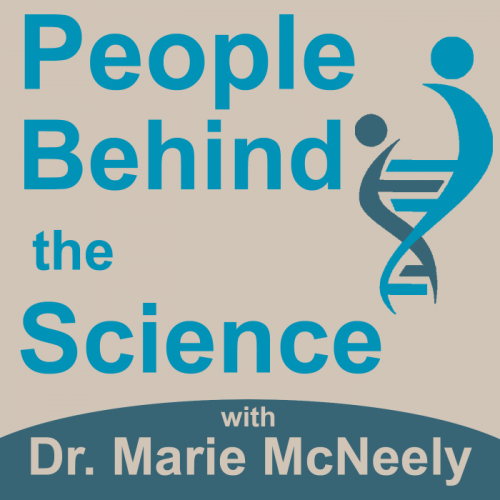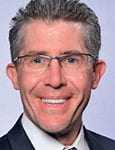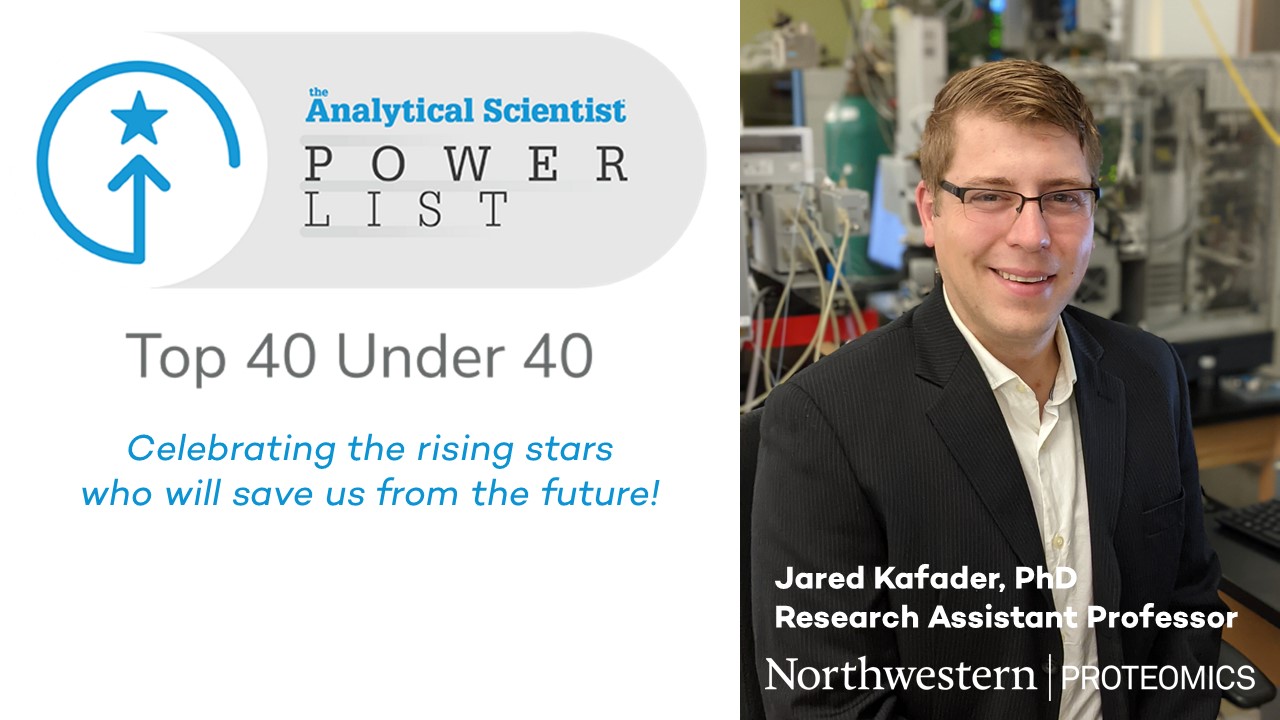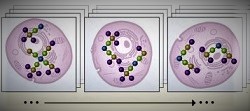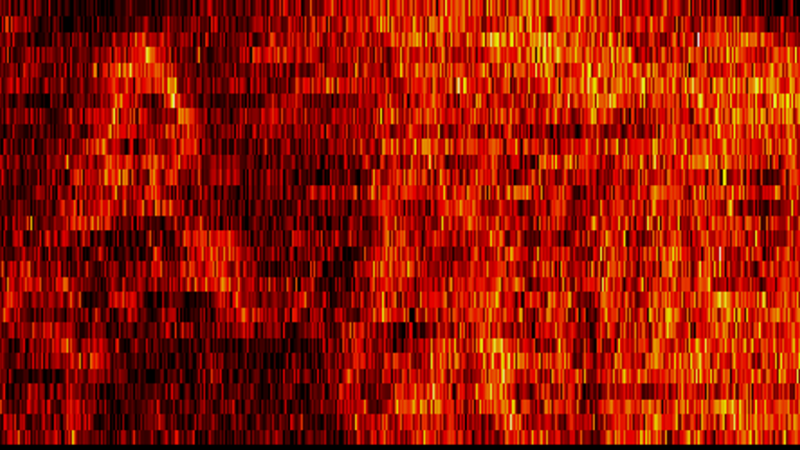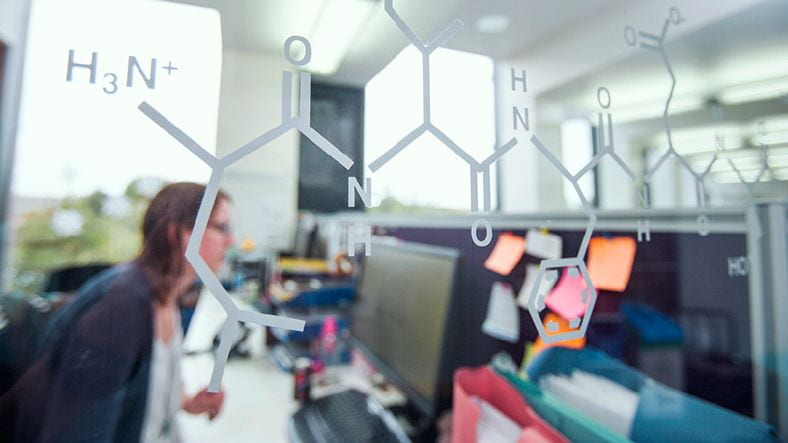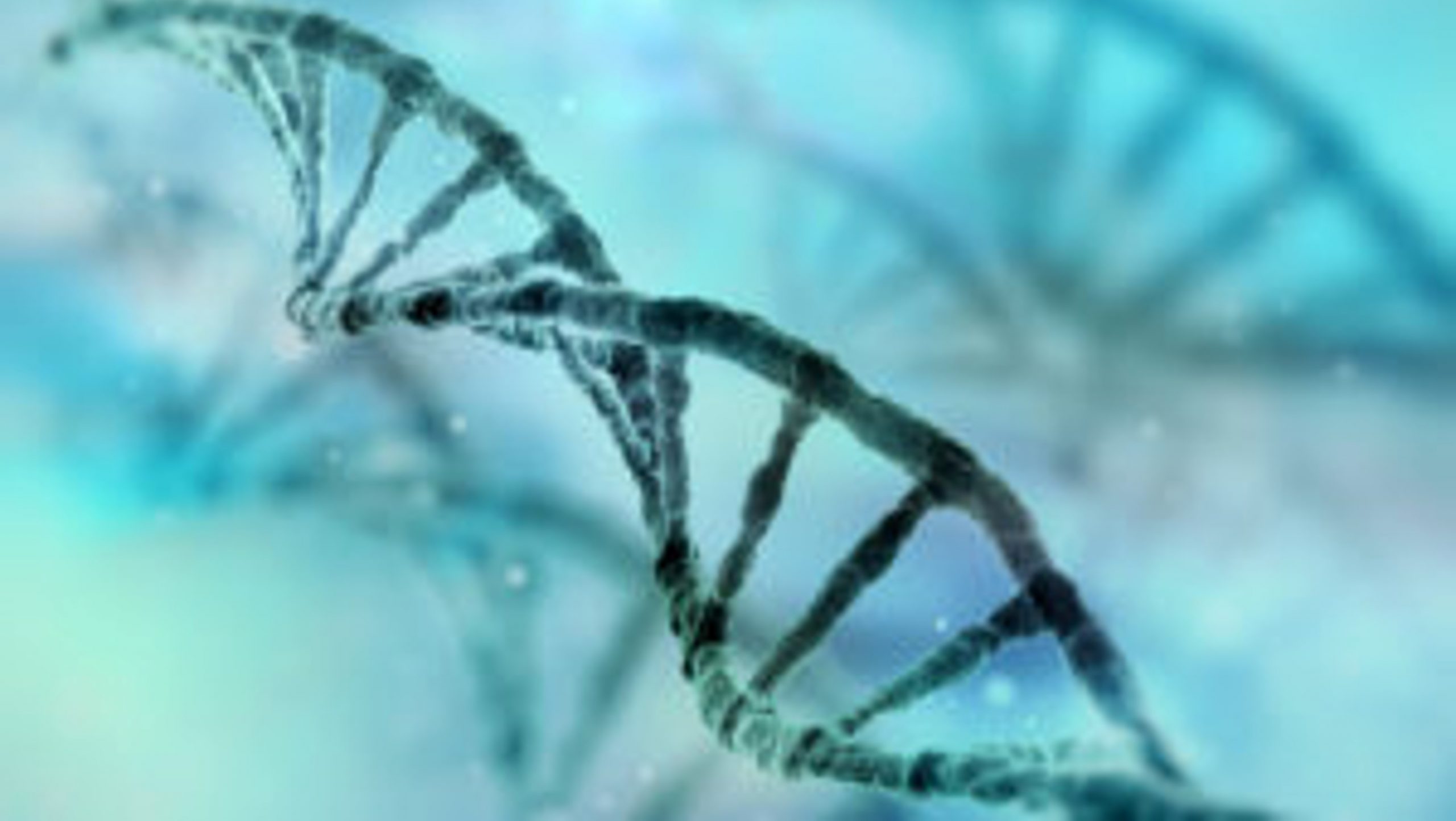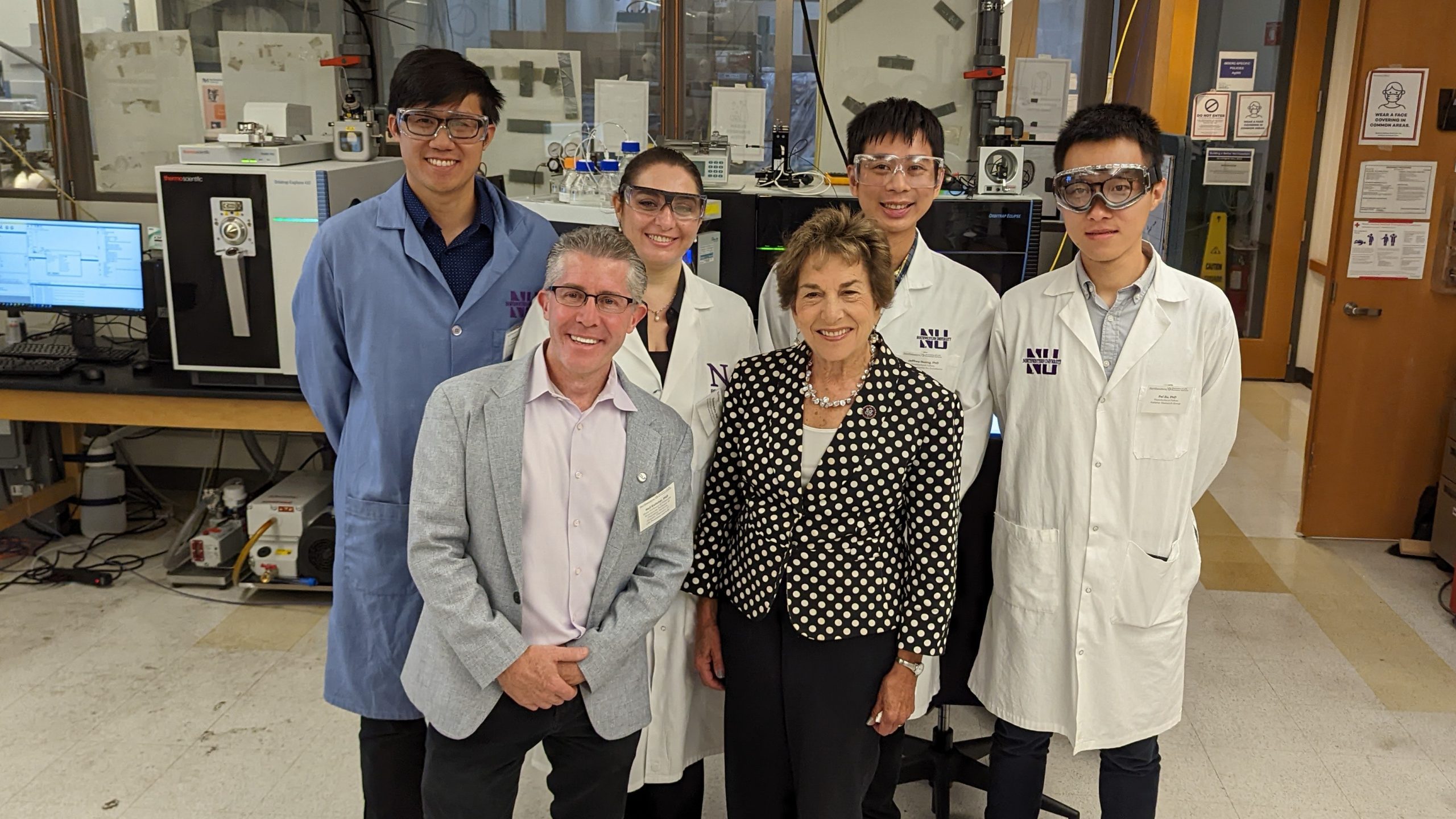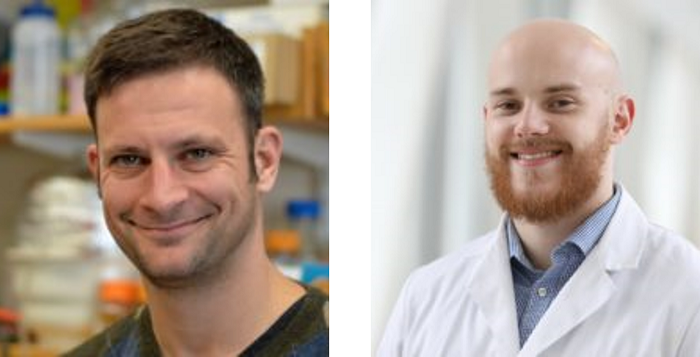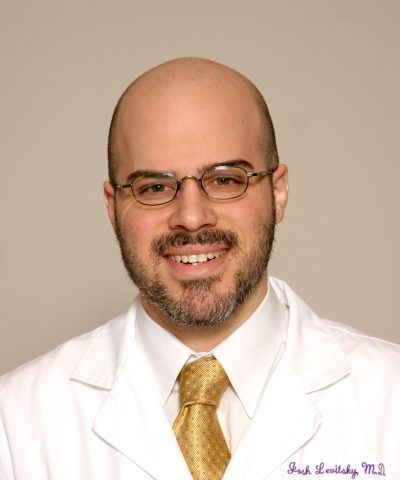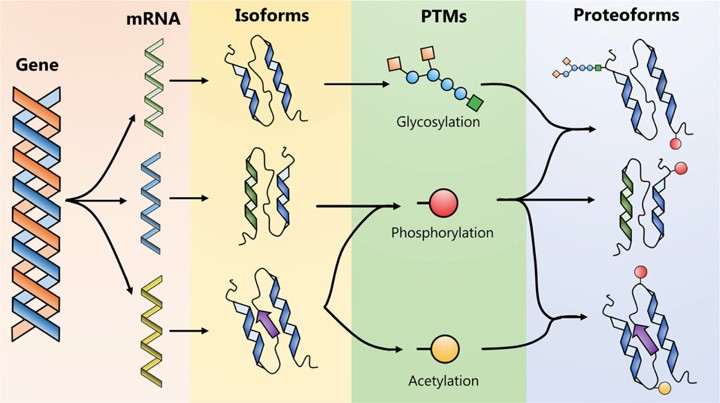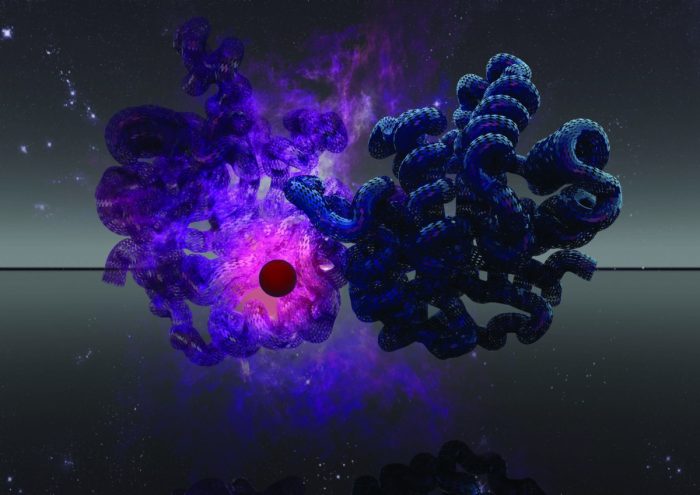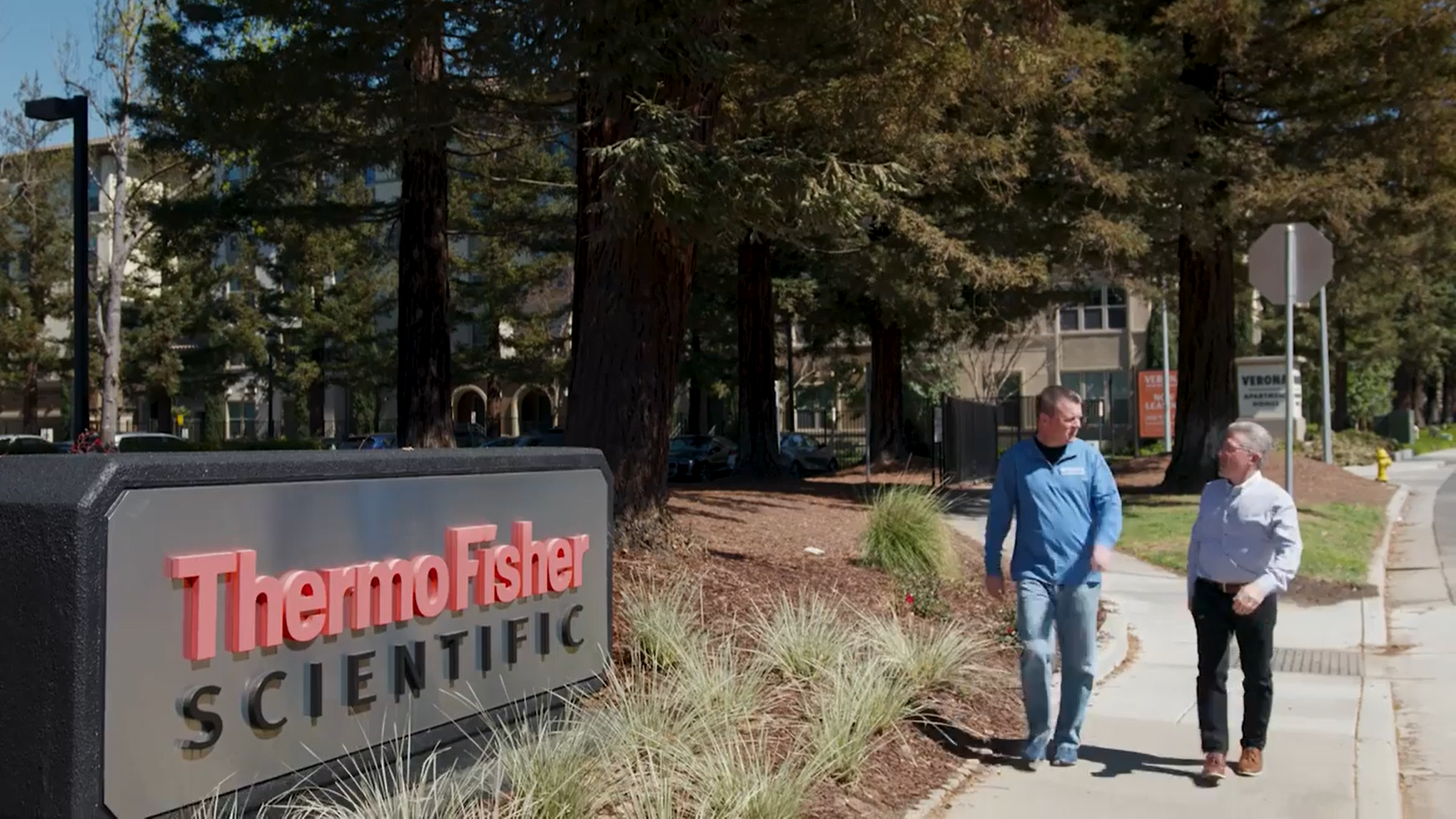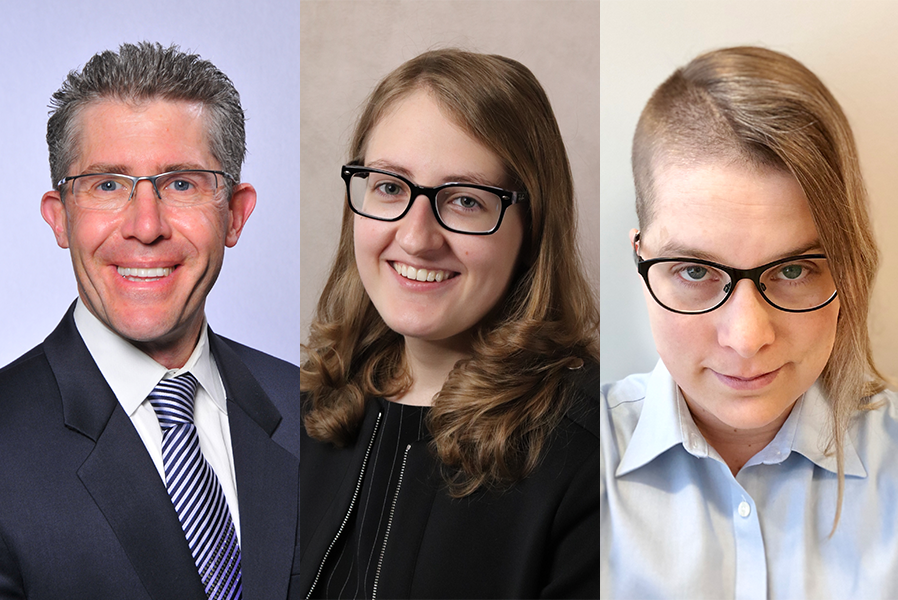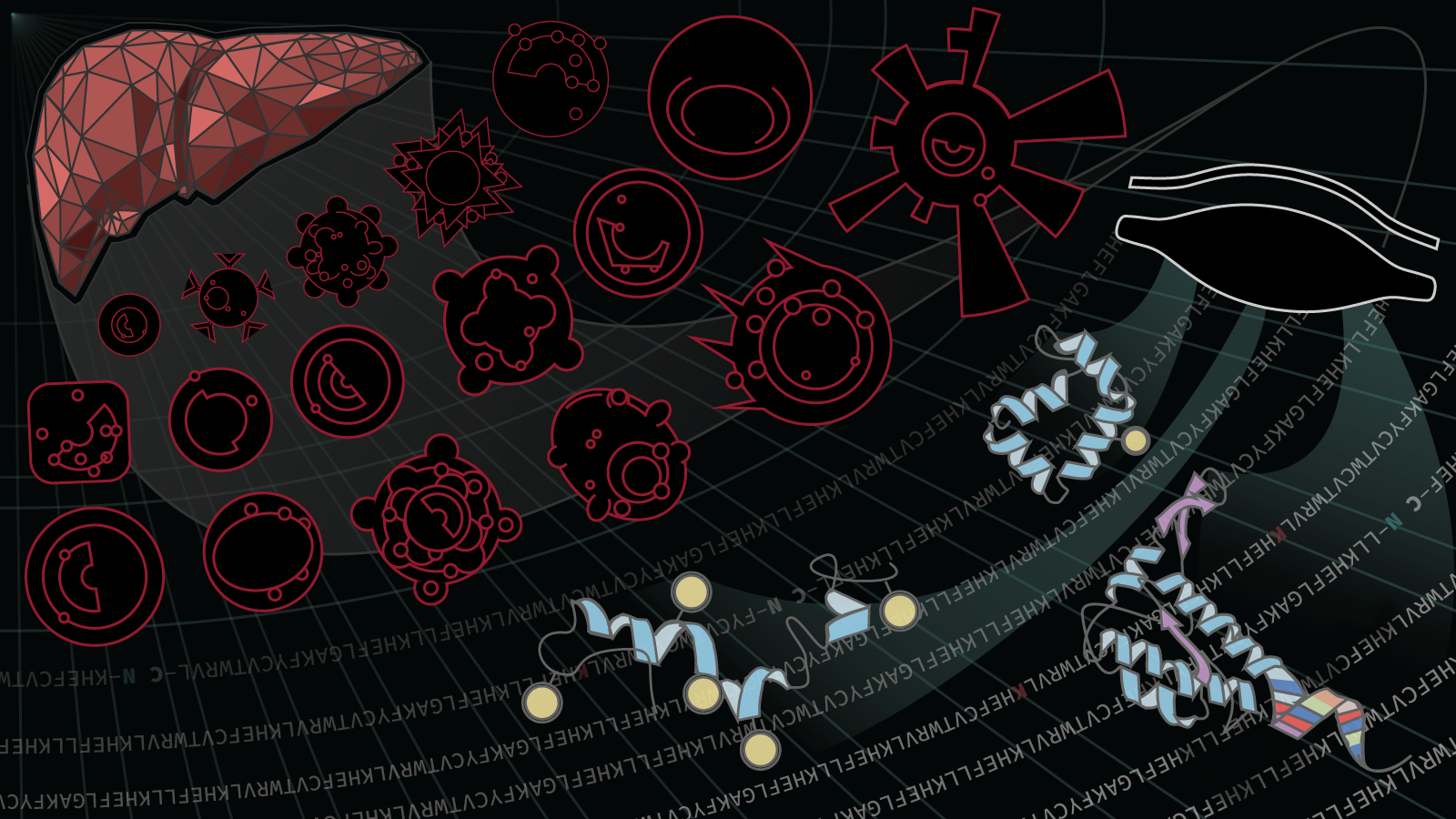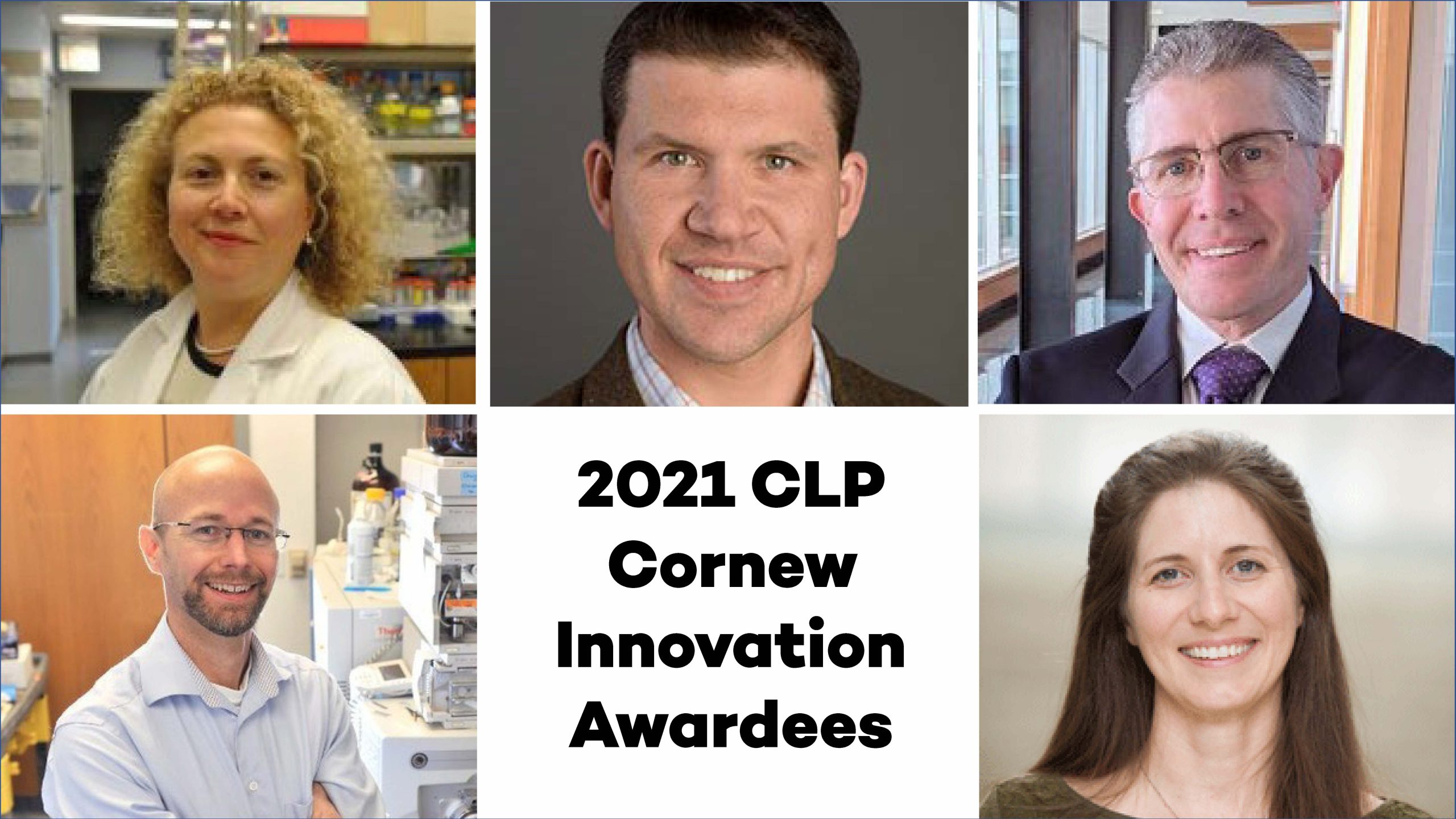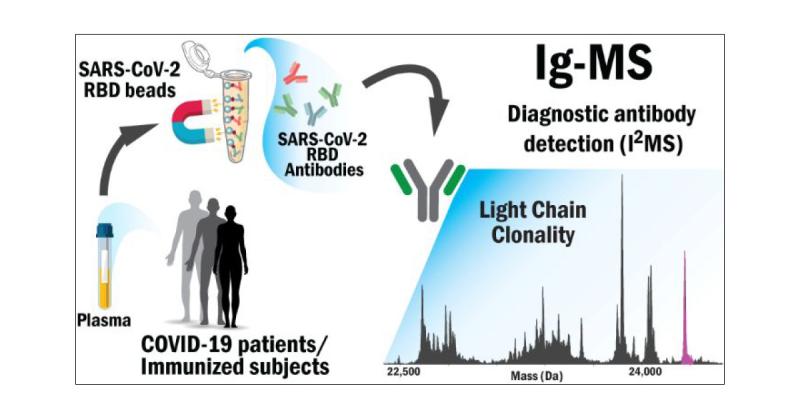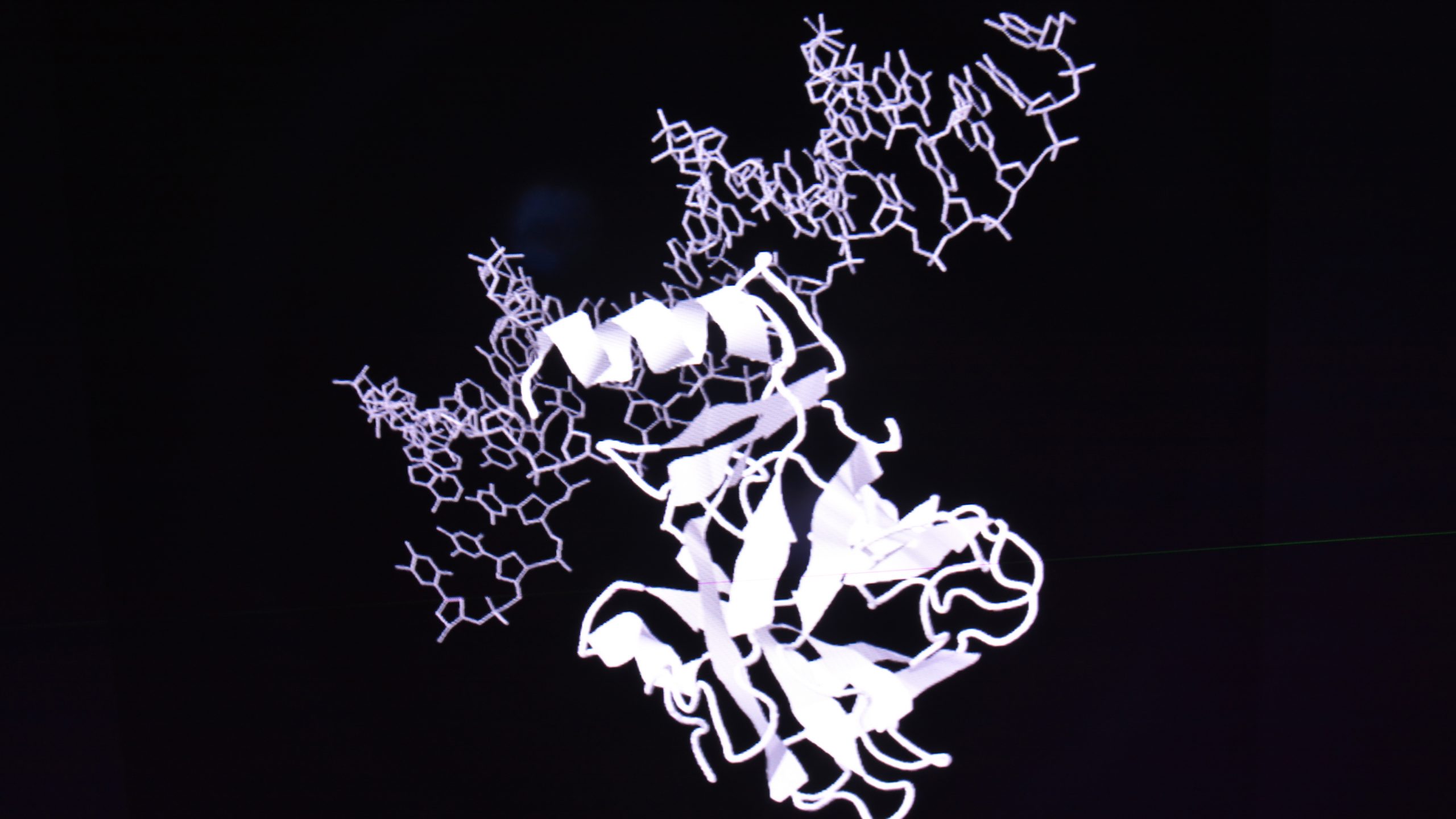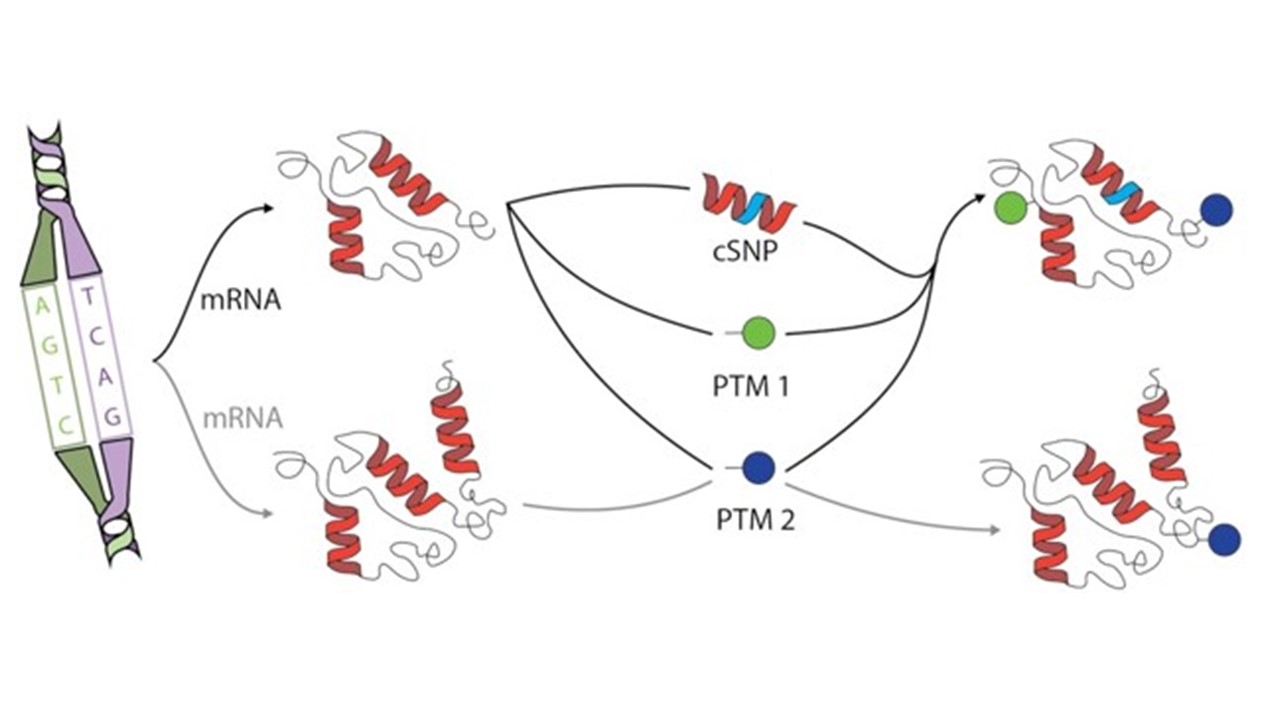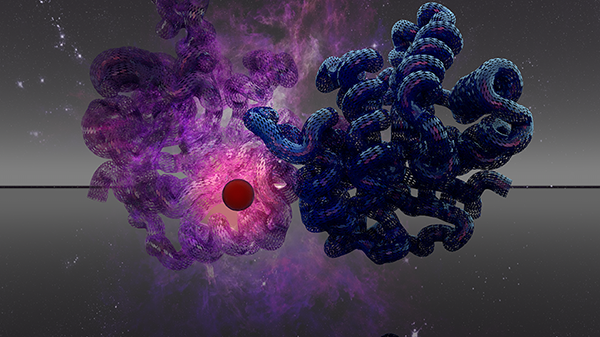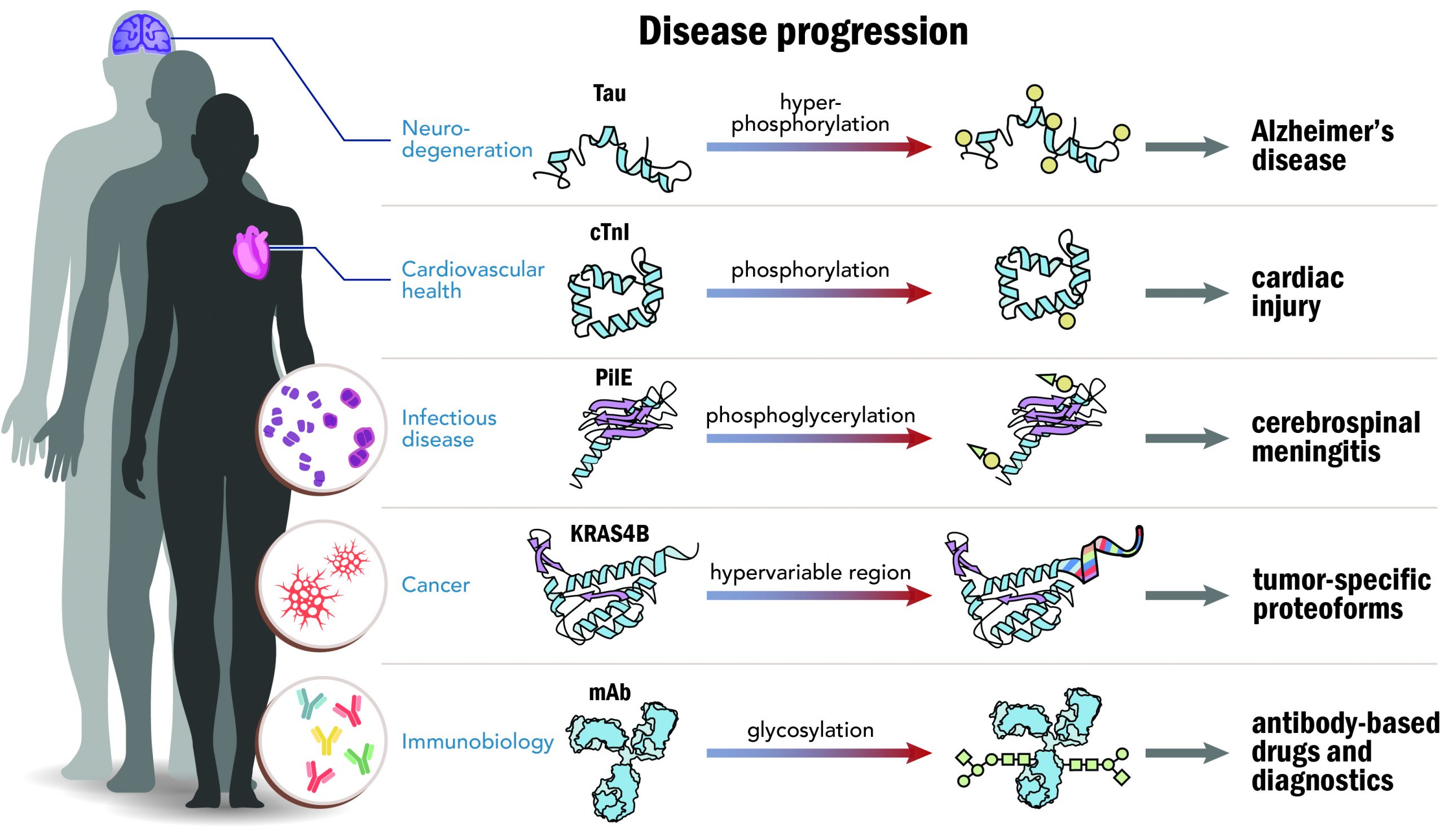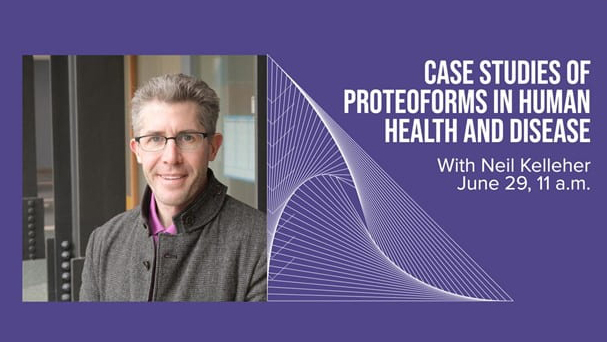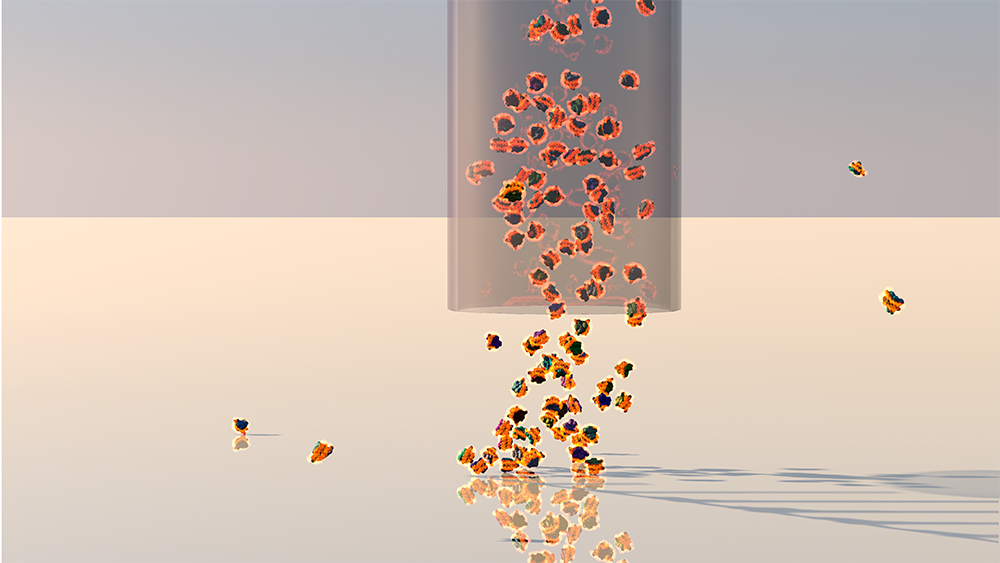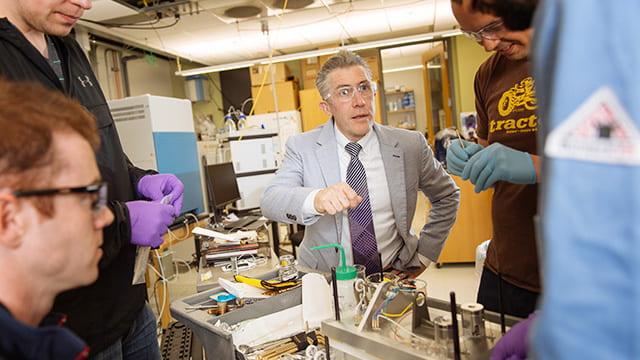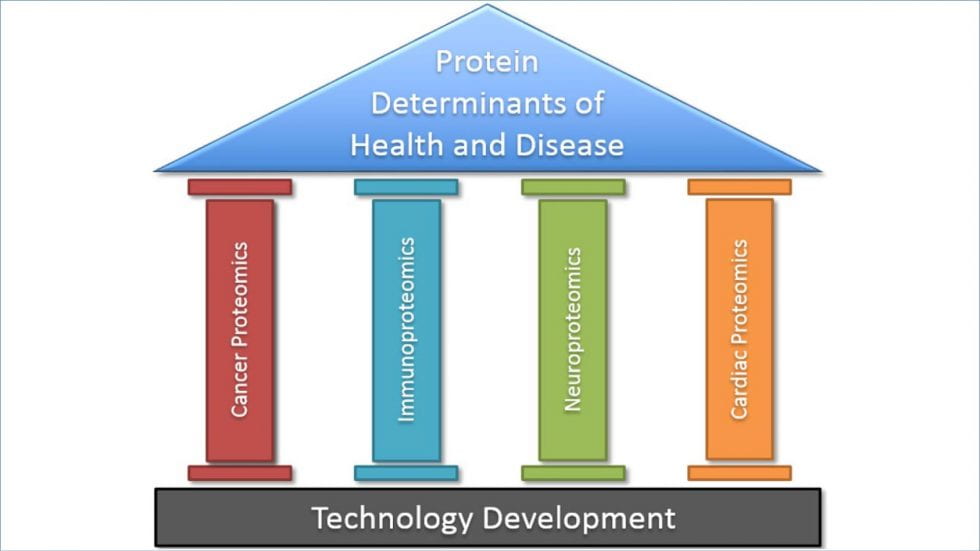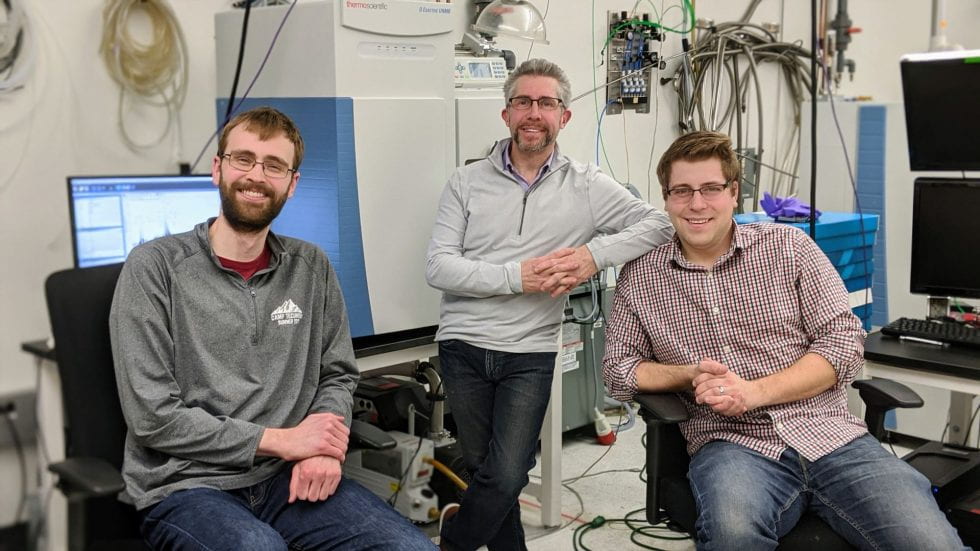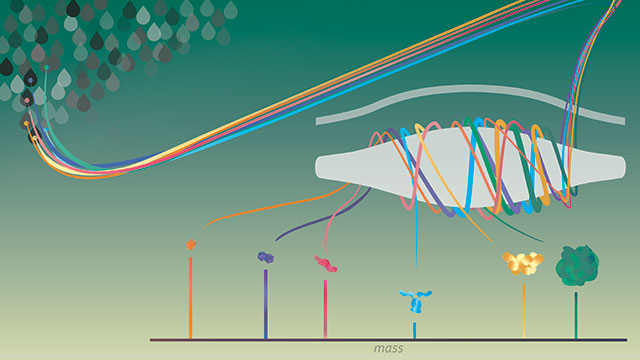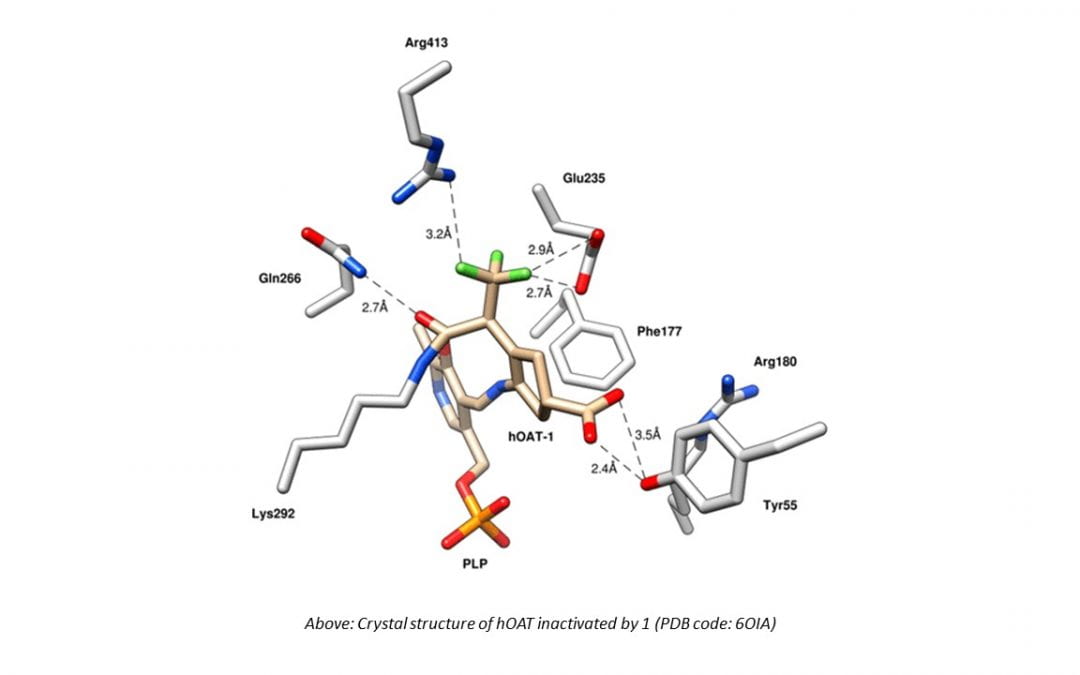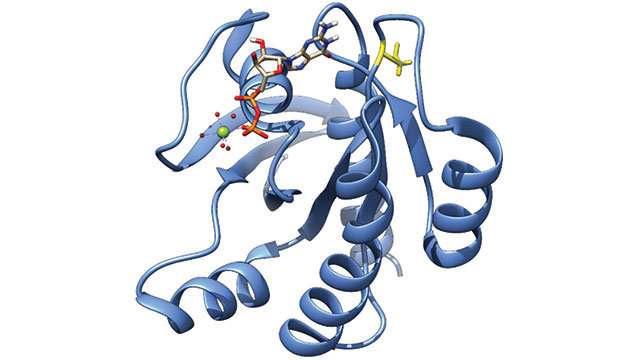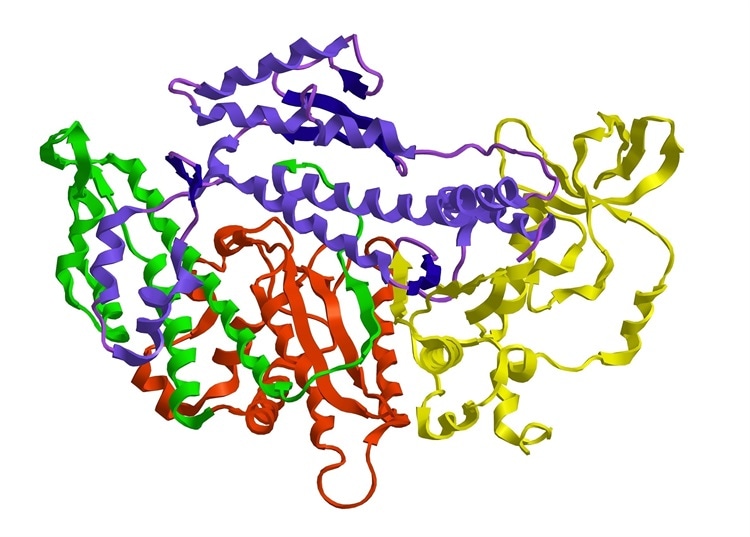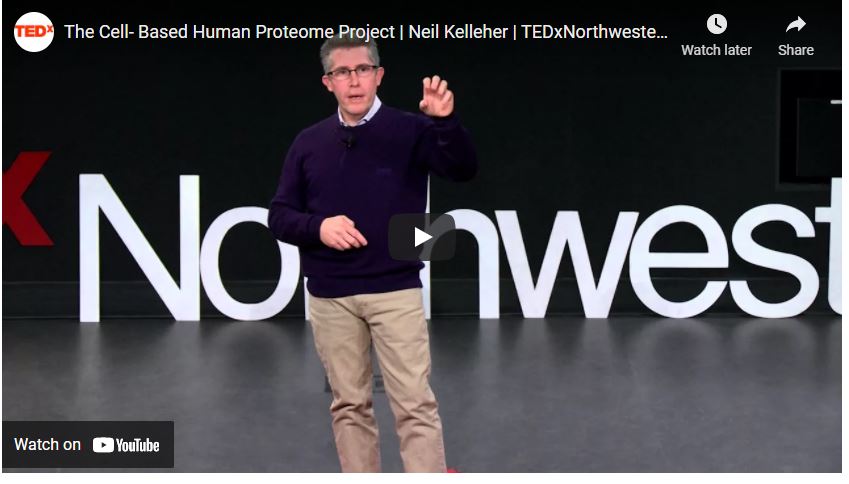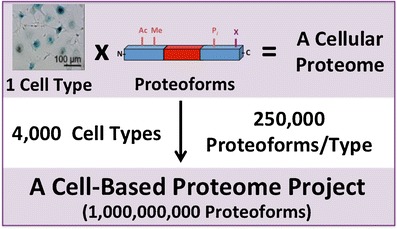As is the case with many other diseases, a protein is thought to be a key driver of Parkinson’s disease (PD). Thanks to a two-year $700,000 grant from The Michael J. Fox Foundation for Parkinson’s Research (MJFF), researchers in Northwestern’s Chemistry of Life Processes Institute (CLP) will work closely with […]
Neil Kelleher, Walter and Mary Elizabeth Glass Professor of Chemistry, Molecular Biosciences, and Medicine at Northwestern University, will present his groundbreaking work and insights at US HUPO 2024 in Portland, Oregon next week as the 2024 recipient of the Donald F. Hunt Distinguished Contribution in Proteomics Award. “Dr. […]
By Olivia Dimmer Nov 9, 2023 Investigators led by Neil Kelleher, PhD, professor of Medicine in the Division of Hematology and Oncology and of Biochemistry and Molecular Genetics, have developed an automated technique for imaging and identifying proteoforms in ovarian cancer tissue, according to results published in Nature Communications. The technique offers the greatest speed and accuracy […]
One hundred and sixty world leaders in proteomics, proteoform biology, cell biology and genomics gathered October 3-5, 2023, at Northwestern’s Prentice Women’s Hospital to present their latest research findings and discuss next-generation proteomics at the second International Top-Down Proteomics Symposium. The Symposium was hosted by the Consortium for […]
No Category
Utilizing advanced top-down proteomics approaches, Northwestern Proteomics researchers and collaborators in the Jewett Lab identified a proteoform responsible for increasing the speed of a well-known metabolic enzyme, Triosephosphate Isomerase (TPI) that drives energy production in the cell. While the traditional bottom-up approach breaks down and degrades […]
What do wrestling and research have in common? “Hard work and discipline,” says student-athlete Troy Fisher, one of four Northwestern wrestling team members who interned for the Kelleher Research Group last summer. Fisher and fellow students Jon Halvorsen, Andrew Davison, and Lucas Davison were tasked with collecting data […]
The Society for Analytical Chemists of Pittsburgh (SACP) and the Pittsburgh Conference on Analytical Chemistry and Applied Spectroscopy (Pittcon), will present the Pittsburgh Analytical Chemistry Award to Northwestern’s Neil L. Kelleher, PhD, the Walter and Mary E. Glass Professor of Molecular Biosciences, Professor of Chemistry, and Professor of […]
Two recent papers by Northwestern Proteomics researchers demonstrate the critical importance of proteoform analysis (the study of all of the different forms of proteins in the human body) in developing and refining treatments for cancer and other diseases. “Proteoforms matter,” says Michael Caldwell, PhD, scientific officer […]
Northwestern University’s Chemistry of Life Processes Institute will host the second International Top-Down Proteomics Symposium which will be held in Chicago, IL, October 3-5, 2023. The Symposium, a Consortium for Top-Down Proteomics event, will gather the global community to present and discuss the latest approaches in proteoform biology (the study of all […]
We have a new presentation explaining the needs and the value of the Human Proteoform Project. Watch Neil Kelleher take you through the project in 12 minutes. Original post can be found here on The Consortium for Top-Down Proteomics website – https://www.topdownproteomics.org/the-human-proteoform-project-video/
For over three years, Northwestern Proteomics has collaborated with the Women’s Health Integrated Research Center (WHIRC) and the Women’s Service Line at Inova Health System to better understand ovarian cancer in hopes of helping women receive the best treatment. The collaboration with the WHIRC at Inova […]
Feature image: (Left to right: Proteomics Center of Excellence researchers involved in CTC projects: Che-Fan (Jeffrey), Huang, PhD, Pei Sue, PhD, Benjamin DeS Soye, PhD, Eleonora Forte, PhD, Fatma Ayaloglu Butun, PhD, Rafael Melani, PhD, and Vijaya Kanchustambham, PhD. Others not pictured: Neil Kelleher, PhD, Nathaniel […]
A team approach is essential when developing more effective treatments for ALS (amyotrophic lateral sclerosis), a progressive neurodegenerative disease affecting nerve cells in the brain and spinal cord. In her ongoing effort to determine the role of proteins in the disease and specifically why the neurons […]
Dr. Neil L. Kelleher is the Walter and Mary E. Glass Professor of Molecular Biosciences, Professor of Chemistry in the Weinberg College of Arts and Sciences, and Professor of Medicine (Hematology & Oncology) in the Feinberg School of Medicine. Neil is the Director of the Chemistry of […]
The Human Proteoform Project needs a US$1.3 billion moonshot to transform our understanding of protein-based disease Neil Kelleher has previously discussed the many merits of top-down proteomics and how they will enable “the earlier and more precise detection of all human disease.” He is currently the […]
Congratulations to Jared Kafader, PhD Research Assistant Professor here at Northwestern Proteomics for making The The Analytical Scientist‘s Top 40 Under 40 2022 Power List! A well-deserved honor. Find out who else made the list here – https://bit.ly/3T0jNOB
In the coming decades, efforts to understand disease will be propelled by building 3D maps of protein arrangements in cells over time, a team of scientists says. A workshop about the study of proteins on a large scale — proteomics — yielded a perspective piece that is part […]
Investigators led by Neil Kelleher, PhD, professor of Medicine in the Division of Hematology and Oncology and of Biochemistry and Molecular Genetics, have developed a new imaging technique that increases the detection of intact proteoforms by fourfold when compared to current protein imaging methods. The imaging technique, detailed in a recent paper published in Science Advances, […]
With researchers touting recent success in sequencing the human genome’s remaining gaps, an emerging frontier is proteomics: identifying and studying an entire set of expressed proteins in the human body and other organisms. Collectively, these sets are called proteomes, and unlike genomes, proteomes alter over time and depict […]
As new technology enables researchers to find and characterize less-common post-translational modifications that drive gene expression and cellular metabolism, the movement to catalog the entire human proteome gains momentum Sequencing the human genome provided biologists with a potential ‘parts list’ of the human proteome, but little […]
In a new article in ACS Chem. Biol., a team of researchers led by Northwestern Proteomics graduate student Luis Schachner show that measuring proteoforms – the specific molecular forms of proteins including post-translational modifications – can shed new light on well-studied systems and unlock avenues to […]
Northwestern Medicine investigators have discovered novel mechanisms underlying a specific transcription factor essential for elongation control, the process of synthesizing RNA from DNA, according to findings published in Molecular Cell. “This is another superb molecular study by Dr. Yuki Aoi whom has been systematically dissecting transcription and transcription elongation […]
Chemistry of Life Processes Institute (CLP) director Neil L. Kelleher and members of the CLP and Northwestern Proteomics team welcomed U.S. Congresswoman Jan Schakowsky from the 9th District of Illinois to Silverman Hall today to discuss the promise and potential of the Human Proteoform Project (HPfP). Other guests included Barbara Cornew, District Director, […]
Northwestern Medicine investigators have discovered novel mechanisms that regulate a cell’s response to molecular stressors, according to a study published in the Proceedings of the National Academy of Sciences. The findings may help improve the understanding of how cancer and other diseases use stress response programming to survive. “Cancers […]
Josh Levitsky, MD, ’08 MS, professor of Medicine in the Division of Gastroenterology and Hepatology, has been selected as president-elect of the American Society of Transplantation (AST). Levitsky’s term as president will begin in June 2023. With more than 4,000 members, the society is the largest transplant organization in […]
Participants in a NIH Workshop on Functional and Integrative Proteomics Abstract. All human diseases involve proteins, yet our current tools to characterize and quantify them are limited. To better elucidate proteins across space, time, and molecular composition, we provide provocative projections for technologies to meet the […]
Northwestern scientists are leading the charge to sequence proteins the way the Human Genome Project sequenced genes and DNA. A recent study in Science confirms they are on to something big. Neil Kelleher, PhD, has been weighing proteins since 1999, when, as a young professor, he opened his […]
Setting audacious goals for technology innovation is a critical component of the Human Proteoform Project, a $1.3 billion movement to weigh and characterize every protein variation, (called proteoforms) in the human body. A new technology announced today, co-developed by Northwestern’s Neil Kelleher, director of Northwestern Proteomics and Chemistry of Life Processes […]
Proteomics is a broad term that can generically be defined as the study of the proteome, or the landscape of proteins expressed within a given biological context. More specifically, proteomics can entail investigating aspects of the proteome such as protein expression levels, post-translational modifications (PTMs), cellular […]
Northwestern University scientist have discovered families of proteins in the body that could potentially predict which patients may reject a new organ transplant, helping inform decisions about care. The advancement marks the beginning of a new era for more precise study of proteins in specific cells. […]
Eight years ago, an international team of researchers proposed that the term “proteoform” be adopted to describe the vast number of forms of protein products from our genes—including changes due to genetic variations, alternative RNA splicing, and post-translational modifications—to reduce the semantic-related ambiguity in the study […]
Chemistry of Life Processes Institute has selected two high-risk, potentially high-reward biomedical research projects to receive CLP Cornew Innovation Awards. The 2021-22 awards will support the development of new technology for creation of viral nanoparticles for gene therapy and research to identify proteins distinguishing ALS pathology in […]
Methods of antibody detection are used to assess exposure or immunity to a pathogen. Here, we present Ig-MS, a novel serological readout that captures the immunoglobulin (Ig) repertoire at molecular resolution, including entire variable regions in Ig light and heavy chains. Ig-MS uses recent advances in […]
This episode of Northwestern University Feinberg School of Medicine’s Breakthroughs Podcast features Neil Kelleher, PhD, director of Northwestern Proteomics and Chemistry of Life Processes Institute. Millions of molecular proteins are swimming through our body’s cells and many studies have discovered that these proteins are the main […]
The Human Proteoform Atlas (HPfA) is a web-based repository of experimentally verified human proteoforms on-line at http://human-proteoform-atlas.org and is a direct descendant of the Consortium of Top-Down Proteomics’ (CTDP) Proteoform Atlas. Proteoforms are the specific forms of protein molecules expressed by our cells and include the unique combination […]
Now that the Human Genome Project has officially wrapped, an international team of researchers will map the entire collection of proteins in the human body. Plans and goals for the Human Proteoform Project were outlined in a paper published last week (Nov. 12) in the journal Science Advances. […]
The Human Genome Project (HGP) was a remarkable and unqualified success profoundly transforming and accelerating biological and medical research while converting a ~ $4B public investment into over $700B of economic activity and new industries (1). The challenge of revealing the “Blueprints of Life,” however, is surpassed by […]
Renowned proteomics expert Neil L. Kelleher has been named director of the Chemistry of Life Processes Institute (CLP), effective Sept. 1. Kelleher succeeds Thomas O’Halloran, who led CLP since it launched in 2005. Kelleher is the Walter and Mary Glass Professor of Molecular Biosciences and professor of chemistry in the […]
Sugars are found in cells and on the cell surface. The Human Proteoform Project will include mapping glycoproteoforms. Nucleic acids, proteins, lipids and small molecules are major constituents of the human cell but as molecular biology barreled ahead in terms of progress, another major class of […]
Participants in a NIH Workshop on Functional and Integrative Proteomics Abstract. All human diseases involve proteins, yet our current tools to characterize and quantify them are limited. To better elucidate proteins across space, time, and molecular composition, we provide provocative projections for technologies to meet the […]
On June 29, 2021, Neil L. Kelleher, PhD, director of Northwestern Proteomics and Chemistry of Life Processes Institute, gave a Zoom presentation, entitled “Case Studies of Proteoforms in Human Health and Disease” at a biannual Translational Applications in Medical Research Lecture event sponsored by at the […]
Northwestern Medicine scientists have developed a new method to analyze the protein composition of intact nucleosomes without losing combinatorial information present in chromatin. The technique, called Nuc-MS, could help scientists more efficiently uncover the mechanisms behind mutation-driven diseases such as some cancers, according to Neil Kelleher, […]
Sitting in ‘easy pose’ at a Midwestern art and meditation festival last year, Chemistry of Life Processes Institute (CLP) predoctoral trainee Luis Schachner began an unexpected journey that led to the discovery of his inner artist and a new role as CLP’s first Artist-in-Residence. “I was very enthusiastic […]
Biotech investors, industry members and academic innovators are invited to attend ‘Biotech by Lake 2021 Investor Summit’, hosted by Chemistry of Life Processes Institute (CLP) at Northwestern. The third annual program will highlight next-generation therapies and approaches to understanding neurodegenerative diseases. Presentations will provide an in-depth look at breakthrough therapies […]
A prominent Northwestern research hub is undergoing a leadership change. Effective Jan. 1, 2021, Neil Kelleher will become interim director of the Chemistry of Life Processes Institute (CLP), as longtime director Thomas O’Halloran steps down. Both scientists are global authorities in their fields: Kelleher is a renowned expert […]
Northwestern University received $7 million this year from the National Institute of General Medical Sciences to continue to push the boundaries of precision proteomics through new technologies and approaches to heart disease, cancer, neurological diseases and immuno-disorders, and to expand community engagement. The five-year grant builds […]
Northwestern Proteomics, a Chemistry of Life Processes Institute-affiliated center, together with an interdisciplinary team of Northwestern mathematicians, experimentalists, biomedical engineers, and biochemists, recently published two academic papers announcing a new, game-changing technique for characterizing and identifying proteins with extreme precision. For the first time, using the […]
Biology can be murky, and medicine involves dealing with very complex mixtures of molecules. A new technology developed at Northwestern University now offers some clarity to scientists with precision measurements of proteins down to their atoms. The powerful new approach, called individual ion mass spectrometry, or I2MS, […]
Congratulations to NU scientists Richard B. Silverman and Neil L. Kelleher on their recent publication in the Journal of the American Chemical Society, titled “Mechanism of Inactivation of Ornithine Aminotransferase by (1 S,3 S)-3-Amino-4-(hexafluoropropan-2-ylidenyl)cyclopentane-1-carboxylic Acid.” The paper addresses new efforts towards developing drugs for hepatocellular carcinoma […]
When a RAS gene operates normally, it acts as an on/off switch for cell signaling to control cell proliferation. But when the gene mutates, the switch jams into the “on” position, allowing cells to proliferate uncontrollably. This unstoppable cascade inevitably leads to cancer. “The mutation in […]
An interview with Prof. Neil Kelleher, conducted by Alina Shrourou, BSc It has been announced that you will be doing a talk as part of the “Structural Mass Spectrometry and Top Down Proteomics of Proteoforms and Their Complexes” symposia at Pittcon 2018. Please can you outline […]
Neil Kelleher’s TEDx Talk, ‘A Plan to Weigh Every Protein in the Human Body: The Cell- Based Human Proteome Project‘ presents a “big science” project with huge implications for how proteins in the human body are catalogued and used for drug therapies and treatments. Since 2011, […]
The general scope of a project to determine the protein molecules that comprise the cells within the human body is framed. By focusing on protein primary structure as expressed in specific cell types, this concept for a cell-based version of the Human Proteome Project (CB-HPP) is […]


